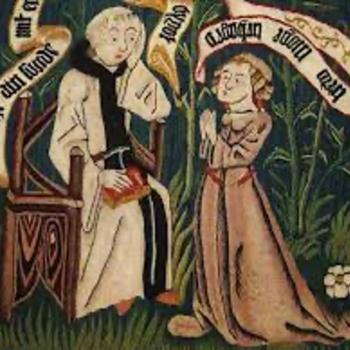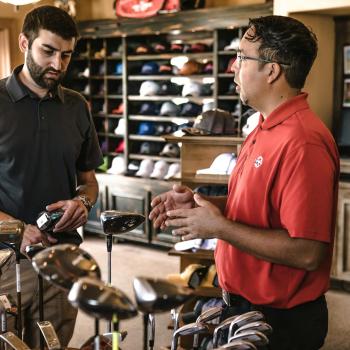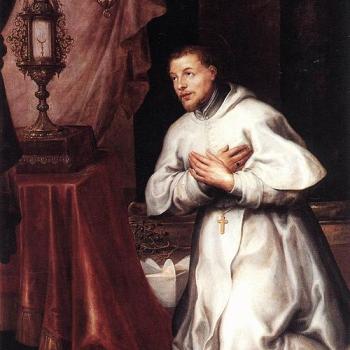Editors' Note: This article is part of the Patheos Public Square on the Pope in America: Implications, Collaborations, Challenges. Read other perspectives here.
I can personally recall all the papal visits to the United States, right back to Pope Paul VI who celebrated Mass at my beloved Yankee Stadium (though not as beloved as Ebbetts Field), through to Saint John Paul II and Benedict XVI. The visit of Pope Francis will make him not only the first (Latin) American pope to come to our shores, but also his first visit here ever.
It took a lot to get the Archbishop of Buenos Aires to leave Argentina, much less for the U.S., which is frequently viewed by Latin America as somewhat crude and materialistic. The cultural view of business tends to be different as well, with many Latin Americans seeing close cooperation between business and government as a given and even a natural symbiotic alliance. The United States tends to breed a much more independent business leader (though we have plenty of our own homegrown crony capitalists), somewhat skeptical of central planners, if not downright suspicious of them.
This, however, is just the tip of the paradoxical iceberg with America and Pope Francis. He comes to the U.S. having made a series of wide-ranging pronouncements that touch on a veritable canon of hot button American issues: climate change, immigration, the role of markets and technology in society, poverty, and of course, sex and abortion.
Aside from his visit to Cuba at the beginning of his trip and his presence at the World Meeting of Families in Philadelphia, the pope's speech at the joint session of the U.S. Congress will possibly be the most scrutinized for its political import. Unfortunately, if Francis, like his predecessors, does not want this speech to be seen through the specifics of American politics (which he surely doesn't), then he could not have chosen a worse venue.
Already those intent on political manipulation are coming out of hiding. Congresswoman Delauro, with ninety-three of her Democratic colleagues, was prompted to send the pope a set of talking points for his speech. These included such specific policy matters as minimum wage laws and the like — as if the pope is just another Tammany Hall political hack. It seems that we're already off to the political races and the speech hasn't even been delivered.
So how might the pope speak to the hearts of the American people, going over the heads of their politicians and even transcending their religious divides? He might begin with something like this:
My dear — and fellow — Americans,
Good afternoon.
I have come to your beautiful country, a part of our vast and prosperous American continents, to be close to you. Like many of you, I am the son of immigrants who came to the Americas seeking a better future for their families. I come to be close to you and your families, to accompany you in the journey of life and to recall the universal values that made you a great nation: Your attachment to the right to life, liberty, and the pursuit of happiness
Yet, even as I say this, we are aware that many of those values are eroded in the present moment. Families, not only on our continents but throughout the world, are becoming eroded by a radical shift in culture that puts having over being, material objects above people, things over relationships, gender theory over reality, and mere pleasure over the pursuit of the good, the true and the beautiful.
This is not a uniquely American problem, of course, but given the vast wealth and technological and social know-how of the American people, America has the potential to offer a world-wide model of humility, generosity, and hospitality. It is a message that could inspire people all around the world to learn once again the truth that my noble and blessed predecessor St. John Paul II reminded you of when he visited the United States in 1995 and said at Camden Yards that "liberty is not the freedom to do what we want but the liberty to do what we ought." This is especially true of religious liberty, which enables us to perform the many charitable works we ought to do, and to come to a new and profound appreciation of human dignity upon which any authentic notion of prosperity and the pursuit of happiness must be built.
These are principles upon which reasonable people can agree and yet can leave ample space for prudential disagreements, which will naturally arise among a free and intelligent people.
When Pope Francis was asked in his "virtual audience" on ABC last week why he thought his visit to the United States is important, he said that "it's difficult not to be close to people. When I approach people...it's easier for me to understand them and help them along life's path. That's why this trip is so important, for me to draw close to your path and your history."
While the pontiff's response was pastoral, it has implications for the best way to lift the poor out of poverty. America has been one of the greatest poverty-reducing machines in history. More than one faithful Catholic has wondered whether this pope understands this truth, which is such a contrast to the broken corporatist economies that characterize much of Latin America.
If the pope takes away just this piece of knowledge from his first voyages to the United States, the benefits for the universal Church would be incalculable.
9/16/2015 4:00:00 AM




